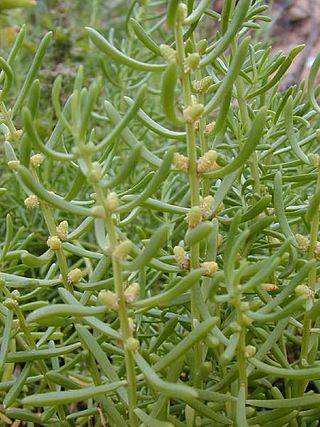
Caesarea, also Caesarea Maritima, Caesarea Palaestinae or Caesarea Stratonis, was an ancient and medieval city in the Sharon plain on the coast of the Eastern Mediterranean, and later a small fishing village. It was the capital of Roman Judaea, Syria Palaestina and Palaestina Prima, successively, for a period of c.650 years, and a major intellectual hub of the Mediterranean, from the time of Herod I until the Muslim conquest of the Levant. Today, the site is an Israeli national park and its ruins are part of the Caesarea National Park.

Ophiussa, also spelled Ophiusa, is the ancient name given by the ancient Greeks to what is now Portuguese territory near the mouth of the river Tagus. It means Land of Serpents.
Guardamar del Segura or briefly Guardamar is a municipality of the province of Alicante located at the mouth of the river Segura in southern Valencia, Spain. It is a Mediterranean resort, with a large pine forest abutting an 11-km-long white sand beach.
Himilco was a Carthaginian navigator and explorer who lived during the late 6th or early 5th century BC, a period of time where Carthage held significant sway over its neighboring regions.
Postumius Rufius Festus Avienius was a Latin writer of the 4th century AD. He was a native of Volsinii in Etruria, from the distinguished family of the Rufii Festi.

Batis is a genus of two species of flowering plants, the only genus in the family Bataceae. They are halophytic plants, native to the coastal salt marshes of warm temperate and tropical America and tropical Australasia.
The Massaliote Periplus or Massiliote Periplus is a theoretical reconstruction of a sixth-century BC periplus, or sailing manual, proposed by historian Adolf Schulten.

In Latin poetry Oestreminis was a name given to the territory of what is today modern Portugal and Galicia, comparable to Finis terrae, the "end of the earth" from a Mediterranean perspective. Its inhabitants were named Oestrimni from their location.

Armeria maritima, the thrift, sea thrift or sea pink, is a species of flowering plant in the family Plumbaginaceae. It is a compact evergreen perennial which grows in low clumps and sends up long stems that support globes of bright pink flowers. In some cases purple, white or red flowers also occur. It is a popular garden flower and has been distributed worldwide as a garden and cut flower. It does well in gardens designed as xeriscapes or rock gardens. The Latin specific epithet maritima means pertaining to the sea or coastal.
Ora maritima is a poem written by Avienius claimed to contain borrowings from the 6th-century BC Massiliote Periplus. This poeticised periplus resulted in an anachronic, non-factual account of the coastal regions of the known world. His editor André Berthelot demonstrated that Avienius' land-measurements were derived from Roman itineraries but inverted some sequences. Berthelot remarked of some names on the Hispanic coast "The omission of Emporium, contrasting strangely with the names of Tarragon and Barcelona, may characterize the method of Avienius, who searches archaic documents and mingles his searches of them with his impressions as an official of the fourth century A.D." Ora maritima was a work for the reader rather than the traveller, where the fourth century present intrudes largely in the mention of cities at the time abandoned, like the legendary Ophiussa. More recent scholars have emended the too credulous reliance on Avienius' accuracy of his editor, the historian-archaeologist Adolf Schulten. Another ancient chief text cited by Avienius is the Periplus of Himilco, the description of a Punic expedition through the coasts of western Europe which took place at the same time of the circumnavigation of Africa by Hanno.

The seaside sparrow is a species of American sparrow.
Cypsela may refer to:

The Tulingi were a small tribe closely allied to the Celtic Helvetii in the time of Julius Caesar's conquest of Gaul. Their location is unknown; their language and descent are uncertain. From their close cooperation with the Helvetii it can be deduced that they were probably neighbours of the latter. At the Battle of Bibracte in 58 BCE, they were, with the Boii and a few other smaller tribes, allies of the Helvetii against the Roman legions of Caesar.
Maritima may refer to:

The Bardili were a small, pre-Roman tribe of the Iberian Peninsula, and an offshoot of the widespread Turduli people, who lived in what is now southwestern Portugal in the 5th-1st centuries BC.

Rita Sahatçiu Ora is a British singer and songwriter. She rose to prominence in February 2012 when she featured on DJ Fresh's single, "Hot Right Now", which reached number one in the UK. Her debut studio album, Ora, released in August 2012, debuted at number one in the United Kingdom. The album contained the UK number-one singles, "R.I.P." and "How We Do (Party)". Ora was the artist with the most number-one singles on the UK Singles Chart in 2012, with three singles reaching the top position.
Mastia is the name of an ancient Iberian settlement, belonging to the Tartessian confederation, once located in southeastern Spain. It has traditionally been associated with the city of Cartagena (Spain). The association has been made principally from the analysis of classical sources in the early 20th century by Adolf Schulten. The first description of the city of Mastia appears in a poem entitled Ora Maritima by the Latin poet Rufius Festus Avienius from the 4th-century AD. The poem claims to contain borrowings from the mythic 6th-century BC Massiliote Periplus. The description of Avienus reads:

The second passage of Curupayty was a naval operation caried out by the Imperial Brazilian Navy in the Paraguayan War on 13 February 1868, which aimed to force, once again, the passage of the Curupayty Fort. This time the passage was carried out by the new Brazilian monitors Alagoas, Pará and Rio Grande, in addition to some other wooden ships. The fleet faced thirty artillery pieces for an hour.
The Nearchi were an ancient tribe dwelling in lower Provence.